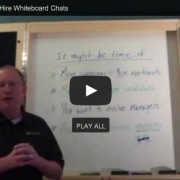Skills Based Hiring
Our team of SHRM certified strategists recently traveled to the 2023 Indiana HR Conference. They came back with a plethora of useful and important information. Over the coming weeks ExactHire will be detailing what we believe to be the most important takeaways from this conference.
Another important concept our SHRM certified strategists addressed was the topic of Skills Based Hiring. Human Resources professionals know it is not easy to fill job openings. Currently, there are approximately 10 million vacant jobs in the United States. Where are all the candidates? That is a question that cannot easily be answered. However, there is a recruitment strategy ready for utilization to attract more qualified candidates, and that is skills based hiring.
Skills based hiring is the concept of screening and evaluating candidates based on their knowledge, skills and abilities (KSAs) and performance potential. This would be instead of focusing on the degree, if any, that they earned and their past job history. Skills based hiring is a way to help organizations fill high-volume and high-turnover positions in particular. It can also be applicable for use in other roles too though. Skills based hiring offers an organization a way to fill vacant roles while exponentially expanding its applicant pool by allowing previously excluded applicants the opportunity to validate their ability to perform in sought after job openings.
Addressing Concerns
Skills based hiring can generate some nervousness within an organization. In a sense, it shatters the philosophy of “We have always done it this way.” believed by many when it comes to the evolution from traditional hiring practices. Changing processes, and especially mindsets, can make a positive impact and promote growth within a company. Shifting from traditional hiring to skills based hiring takes planning, research, communication and teamwork. For major change to occur in the workplace, senior and executive leadership must champion the cause with Human Resources. Their support and investment will then flow to hiring managers who will be the ones responsible for applying the concept. As buy-in occurs, the momentum shifts, and the ability to hire focusing on skills begins.
How to Get Started with Skills Based Hiring
Now that the organization is ready to progress with skills based hiring, what is next? In partnership with leadership and departments, Human Resources must identify and itemize the particular skills that are essential to perform the functions of the roles in the company. What skills are needed for the company to operate at high productivity? Are there skills our current employees have that contribute to the company’s success? What skills do we need to maintain or improve operations? Are there skills we’re lacking? Composing an inventory of skills takes time.
Analyze existing job descriptions to identify essential components. Examine requirements closely. While certain fields (ex. Healthcare and Education) require specific credentials for various roles, determine if other roles must have certain criteria required. For management, sales, or service roles, does the job really need a bachelor degree? A degree is not an automatic indicator for success in a role, but job-specific demonstrated skills can be indicators of potential success.
Incorporating Skills Based Hiring
After a thorough internal skills assessment, it is time for an organization to take the initiative. They need to reduce the company’s gaps by filling vacant roles. Job posting, when doing skills based hiring, takes diligence to communicate what is essential while removing what is not while using language that is inclusive. Careful wording is essential. According to LinkedIn, job posts that highlight “responsibilities” instead of “requirements” get 14% more applications per view. It takes meticulous review and thought to remove any conscious and unconscious bias. Within the job description, skills based hiring shifts focus from degree(s) attained and experience by targeting potential applicants who meet an itemized list of specific competencies and skills required and preferred for optimal performance.
When creating a skills based job listing, stakeholders must identify the competencies needed for job success. Then you should rank those in priority order. Specify deal breakers by classifying which skills are “must have” and which skills are “would like to have”. Doing so will still filter unqualified applicants but yet not close the door on applicants who have some but not all of the skills listed for success. According to Harvard Business Review, women will not apply to a job listing if they do not meet 100% of the criteria while men usually apply after meeting about 60% of the criteria. Skills based hiring is meant to identify qualified candidates who can successfully do the job so ensure that required and preferred skills are carefully and accurately labeled. If criteria is labeled incorrectly, an organization will miss out on qualified candidates and impede cultural growth and diversity.
Helpful Accessories for Incorporating Skills Based Hiring
HR professionals and hiring managers should use their applicant tracking system (ATS) to post their skills based job listings to operate efficiently and select a variety of job boards to post to in one attempt. As HR and hiring managers screen candidates, communicate quickly with applicants to increase engagement and before they get hired by a competitor. Text or email to set up an initial phone screen. In the phone screen, ask questions which allow the interviewee to share past and current experiences that elaborate upon and validate employer sought skills. Create specific skills based interview guides in the ATS to standardize the interview process. Focus on the goal of finding the right talent instead of the intricacies of degrees earned or not earned. According to McKinsey, hiring for skills is five times more predictive of job performance than hiring for education.
Conclusion
Skills based hiring offers many benefits. It promotes equity for people in their desire to earn a high-paying wage. Millions of job seekers who were previously overlooked or ineligible for consideration can attain better financial stability in higher paying roles which were previously unattainable to them due to degree requirements. According to LinkedIn, employees without a bachelor degree tend to stay 34% longer than employees without a degree. Organizations benefit with an expanded talent pool to relieve employee shortages and see an increase in employee loyalty. Workforce diversity increases which enhances productivity. Skills based hiring is a win-win for organizations and job seekers. If you would like to see skills based hiring in action with ExactHire’s Full Service Hiring, please reach out to us to discuss how this service can save you time and money.









